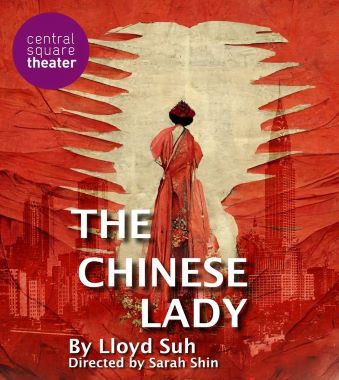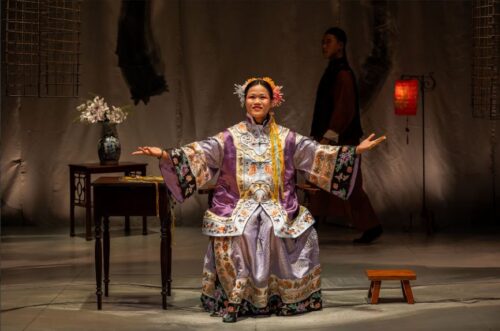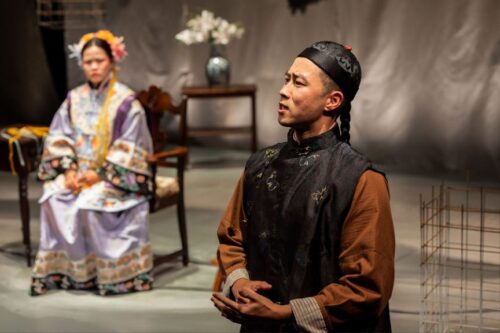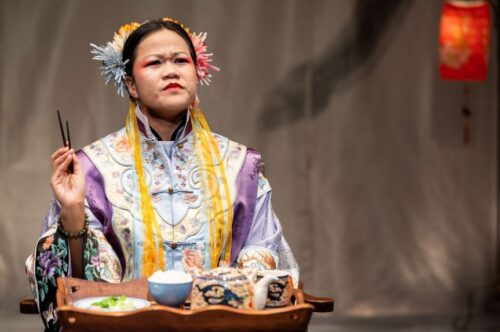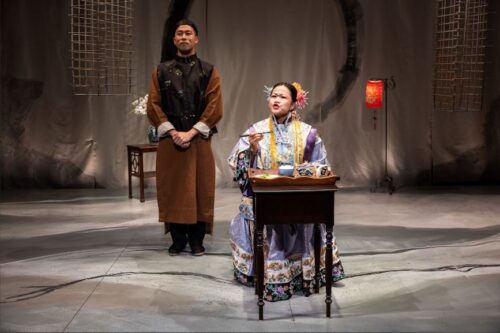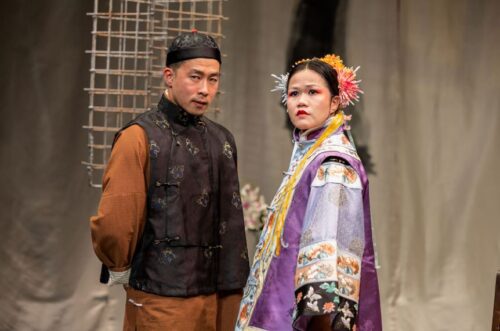BONE-DEEP CHINA
Afong Moy was brought to the United States by Boston-born traders known as the Carnes Brothers, merchants who exhibited Moy in a room filled with “Chinese curiosities” including money, musical instruments, and a bell, along with vases, rugs, and other decorative objects that were available for purchase. Moy, believed to be the first Chinese woman to be seen in the U.S., wore Chinese clothing and a Chinese hairstyle as she demonstrated the use of chopsticks, and most fascinating to Americans, walked about the room on her 4-inch-long feet “having worn iron shoes for the first ten years of her life, according to the custom of the country,” according to Carnes Brothers’ advertisements.
Lloyd Suh’s 2018 The Chinese Lady, reportedly the most produced play in the country in the past year (see S&C reviews of L.A. and NYC productions), has arrived at Central Square Theater in Cambridge one hundred and eighty-eight years after Moy left her home in Guangzhou, China, in 1834, at the age of fourteen. (The play is produced in partnership with Boston’s CHUANG Stage.) Suh uses the limitations faced by young Afong Moy and her translator and attendant, Atung, to create a play that reveals not just the life of a pair of previously invisible characters, but the broad span of anti-Asian policy and sentiment in U.S. history.
This two-hander features Sophori Ngin, who plays Afong Moy (a stage name) with a youthful impishness that evolves into a knowing and sorrowful understanding over the years of her exhibition. Jae Woo, as translator Atung, shines in his role as translator. Most notably during Afong Moy’s meeting with “Emperor Andrew Jackson” (as she calls him), in which Atung interprets Jackson for Afong Moy and the audience. This scene shocks, yet director Sarah Shin ensures that the tone is melancholic and heartrending throughout.
Afong Moy’s parlor traveled with her when she left New York City to visit other cities, including Baltimore, Philadelphia, Boston, and Cincinnati. Qingan Zhang (sets) Arielle Greenspan (props) and Kat C. Zhou (lights) put what must have become an increasingly restrictive environment for Afong Moy to good use in the simple yet evocative setting. Kai Bohlman (sound) and Sandra Zhihan Jia (costumes) convey passage of time and Afong Moy’s growing loss of connection to her birthplace.
Ironically, it was the arrival of large numbers of Chinese workers and gold-seekers in the late 1840s that brought an end to Afong Moy’s tenure with the Carnes Brothers. Chinese people had become common enough that Americans were no longer willing to pay to see the Chinese Lady. Chinese immigration had in fact become a threat, and Suh transcends the limitations of what is known about Afong Moy’s life and her likely lifespan to provide a broader history of the discrimination and violence directed toward Chinese people. Central Square Theater builds on this history with exhibits in the lobby area and with notes from production dramaturg Alison Yueming Qu and assistant dramatrug Kira Gandolfo in the printed program and website.
photos by Nile Scott Studios
The Chinese Lady
Central Square Theater, 450 Massachusetts Avenue in Cambridge
in partnership with CHUANG Stage
ends on December 11, 2022
for tickets, visit CST
